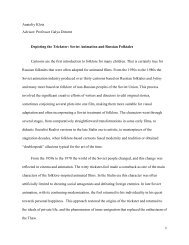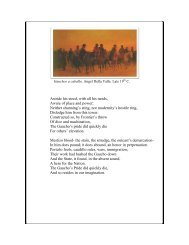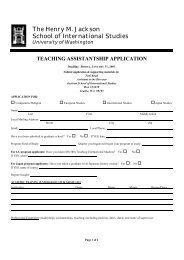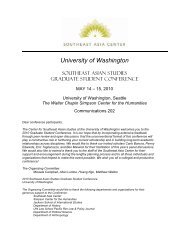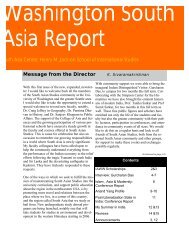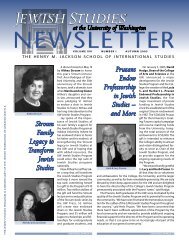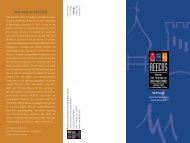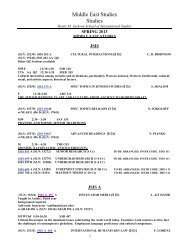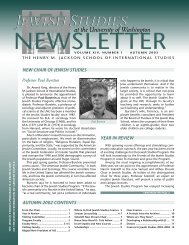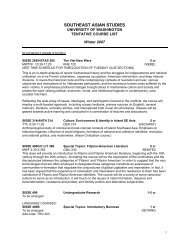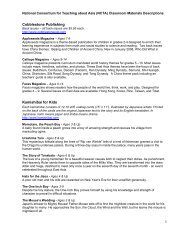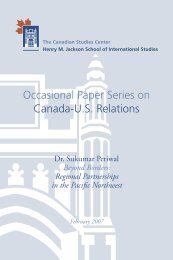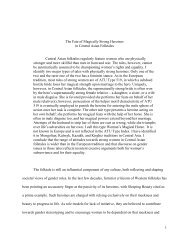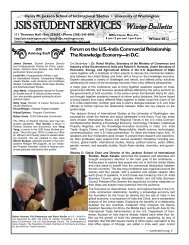COMPARATIVE RELIGION COURSES
COMPARATIVE RELIGION COURSES
COMPARATIVE RELIGION COURSES
Create successful ePaper yourself
Turn your PDF publications into a flip-book with our unique Google optimized e-Paper software.
<strong>COMPARATIVE</strong> <strong>RELIGION</strong> <strong>COURSES</strong><br />
WINTER QUARTER 2013<br />
JSIS B 202 Introduction to World Religions: Eastern Traditions Tokuno TTh 1:30-3:20<br />
JSIS B 254 American Religion Wellman TTh 1:30-3:20<br />
Seeks to understand religious diversity in the American context and the varieties of religions in<br />
the American historical horizon including religious minorities, American Protestants, public<br />
religious expressions, and new American religions.<br />
JSIS B 307 Religion and World Politics Gill TTh 10:30-11:50<br />
This course explores the intersection of religion and politics in various regions of the world,<br />
including the U.S., Europe, Middle East, Latin America, and other regions. Presents a historical<br />
perspective on religion alongside contemporary issues in religion, politics, and church-state<br />
relations. Given the short, 10-week quarter system, we will not be able to cover every religious<br />
tradition. Instead of doing a superficial survey of religion and politics in each region of the<br />
world, we will focus most of our attention developing a theoretical framework based on the<br />
Christian world, then turning our attention to Islam in the last 2-3 weeks.<br />
JSIS B 407 Political Islam and Contemporary Islamist Movements Robinson<br />
TTh 1:30-2:20<br />
This seminar will examine 3 Islamist movements (movements to reform Muslim society through<br />
the capture of the modern state and the establishment of Islamic practices, especially Islamic<br />
law). The goal is to understand how Islamist movements have shaped the both regional politics<br />
and the emergence of global political Islam. The course will start by reading briefly on the<br />
history of modernist Islam and the rise of Islamist theory and political parties. Then the course<br />
will look at 3 parties in their regional Islamic context (Pakistan, Palestine, Indonesia). The final<br />
part of the course will focus on student’s own research.<br />
JSIS B 472 Topics in Early Christianity: The Legacy of Paul Tite WF 1:30-3:20<br />
One of the most significant figures in first century Christianity was Paul of Tarsus. Indeed, some<br />
have gone so far as to claim him as the founder of Christianity. Paul’s dynamic and challenging<br />
sense of mission resulted in his extensive founding of Christian communities. Within the social<br />
network of these communities, he entered heated debates with competing Christian<br />
leaders/groups regarding the social and theological identity of Christianity. Paul’s most obvious<br />
impact, however, is his significant literary output. Indeed, most of the New Testament is<br />
comprised of his letters, or letters written in his name. This course offers an introduction to Paul,<br />
his letters and his legacy. Our exploration will focus on three aspects of Paul and his legacy:
econstructing the historical Paul (who was he, when did he live, how was he portrayed in<br />
Acts?); exploring Paul and his communities through his letters (as primary sources, this will be<br />
the focus of the course); and how Paul was used by other early Christian writers (e.g., letters<br />
written in his name, narrative and apocalyptic use of Paul as an authoritative figure into the<br />
second century, etc). Our focus in this course will be upon reading the primary texts in English<br />
translation, using assigned secondary readings (supplemented by lectures) as a background for<br />
reading these texts. A mixture of lecture and discussion will frame this course.<br />
JSIS B 526 Political Islam and Islamic Fundamentalism Robinson M 1:30-4:20<br />
Focusing on recent analysis of Muslim civil society and the Islamic public sphere, this course<br />
examines political Islam as a phenomenon produced at the intersection of universalistic and<br />
particularistic political cultures and in the spaces between political, religious, and social<br />
authority. The aims of this course are to introduce students to the complexities of issues<br />
surrounding Islamic political movements in contemporary Muslim societies and to learn to<br />
examine Islamic political movements through critical analyses that take into account historical,<br />
social, and cultural perspectives; to assist students in engaging in reflective knowledge<br />
production, examining discipline-specific suppositions of method and analysis as well as the<br />
overt contents of the sources; and to assist students in placing their reading and research within<br />
the intellectual genealogies of established scholarship.<br />
JSIS 481/MUSIC 445 Performance, Power, and Identity in Africa Ellingson 3-5 cr.<br />
F 1:30-3:50 http://faculty.washington.edu/ellingsn/Africa_Perf.html<br />
Chiefs and kings dance, sitting in palanquins carried on the shoulders of their subjects through<br />
the streets of the city, as traffic stops in recognition of the periodic reinvestment of power in<br />
human subjects. Ordinary people dance, in processions where they show respect or stage comic<br />
lampoons of power, at nightclubs, and at funerals where they may celebrate the life of a complete<br />
stranger or the father they knew but were not related to, find a partner in business or love, see a<br />
fish-shaped coffin or a sheep draped in an American flag. Traditional priests dance, as their<br />
drummers call down the gods who will possess them and behave in unexpected, spectacular<br />
ways; and Christian churchgoers dance down the aisle to the altar, perhaps to the same drums as<br />
the traditional priests. And each performance includes many visible and hidden layers of<br />
meaning, from the funeral to the notorious "Drum Wars" which recently raised fears of religious<br />
conflict, but which have deep roots not only in ideological differences, but also in the political<br />
economy of modern nation-building.<br />
Africa is the postmodern world in its most vivid manifestation, caught up in the great twenty-first<br />
century confrontations of globalization and the local, of religion and secularism, of tradition and<br />
change, of individualism and community. And above all, Africans see all around them many<br />
different vectors of constraint and opportunity, that seem to point chaotically in every opposing<br />
direction towards every imaginable future, in societies where people grasp for freedom to make<br />
crucial choices for themselves, even as they feel pushed and pulled in many directions at once by<br />
forces they have little control over. And so, encouraged by their culture, Africans dramatize their<br />
conflicts and their choices in performances that both mirror and reflect back upon the political,<br />
economic and spiritual powers that shape and empower their lives, through which they forge and<br />
declare their identities. This class will explore some of these performances and their place in the<br />
lives of the people who create them.
JSIS 490 A Special Topics: American Megachurches Wellman M 1:30-4:20<br />
American Megachurches (2,000 or more attendees on a Sunday) have exploded in growth<br />
since 1970; something in the neighborhood of 40 percent of American churchgoers attend these<br />
kinds of churches today. In a real sense, if we don’t understand American megachurches we<br />
don’t understand American Christianity—perhaps not even American religion. In fact, many UW<br />
students have grown up in these churches; Rick Warren’s Saddleback Church in Orange County,<br />
Ca.; Joel Osteen’s Lakewood Church in Houston, TX, and Mark Driscoll’s Mars Hill Church in<br />
Seattle, are just a few of the literally hundreds of megachurches in the U.S. and around the<br />
world. This will be your chance to understand, visit one or two, and understand how and why<br />
they are so popular in American culture.<br />
The typical critique of these churches is that they are consumer-driven manipulators of the<br />
public; they support a conservative political agenda and are more than often driven by a form of<br />
prosperity gospel. We will seek in this course to go beyond these kinds of superficial evaluations<br />
to analyze these congregations as religious organizations and to understand the behaviors, habits<br />
and beliefs within the American context and culture. Like all religious phenomenon, these<br />
churches borrow from their surrounding culture, but they also impact that culture: theologically,<br />
morally and politically. Our task is to understand these organizations and their relation to the<br />
culture from a sociological, psychological and moral/religious perspective.<br />
JSIS 490/590 B Women in Buddhism: Seminar in Buddhist Studies Tokuno<br />
MW 3:30-5:20<br />
The course will explore issues of gender and sexuality in Buddhism based on readings of<br />
canonical texts, biographical narratives, ethnographical reports, and modern scholarships.<br />
Discussion topics will include: question of methodology and feminist perspectives; religious<br />
institution and patriarchy; gendered symbols and their interpretations; doctrinal egalitarianism<br />
and androcentric practice. Students will learn about a wide spectrum of roles of and attitudes<br />
toward women and the feminine reflected in Buddhist doctrine, practice, and experience both in<br />
pre-modern and modern/contemporary contexts, and how they are informed by a complex of<br />
factors, including social-institutional norms and soteriological ideals of Buddhism. We will<br />
begin with consideration of methodology and feminism, followed by discussion of India, Tibet,<br />
Southeast Asia (Thailand), and East Asia (China, Korea, Japan). The penultimate session will<br />
cover women’s participation and leadership in new religious movements in India, Taiwan, and<br />
Japan.<br />
JSIS 590 Heterodox Cosmologies and Social Behavior Williams Th 3:30-6:20<br />
What relationships exist between myths about the origins and nature of the cosmos and social<br />
behavior or lifestyle? This seminar will focus on this question with particular regard to<br />
cosmological myths that are often considered more “dualistic,” or that imagine the cosmos to be<br />
the product of, and under the control or influence of, forces other than the highest “god” or most<br />
sublime level of reality. Examples that will likely be treated include Platonic/Middle<br />
Platonic/Neopythagorean philosophical traditions; select instances of heterodox early Christian<br />
speculation (e.g., texts from the Nag Hammadi Coptic library; the North African writer Arnobius<br />
of Sicca); Hermetic literature (e.g., the Poimandres); Manichaean, Mandaean and Islamic<br />
mystical texts; and medieval Christian heterodox traditions such as the Cathars.
Fascination with most of these traditions stems from their association with esoteric or<br />
“heretical” teachings. They have evoked a very large bibliography of research, with the majority<br />
devoted to philologically oriented studies on recovered sources (editions, translations);<br />
description and comparison of deviant mythologies; theories about their origins and<br />
interconnections; and reconstructing the history of the theological conflicts surrounding them.<br />
There has also been significant interest in the impact of these traditions on social and political<br />
history, again primarily in terms of the historical significance and consequences of sociopolitical<br />
conflicts between “orthodox” and “heretical” factions.



